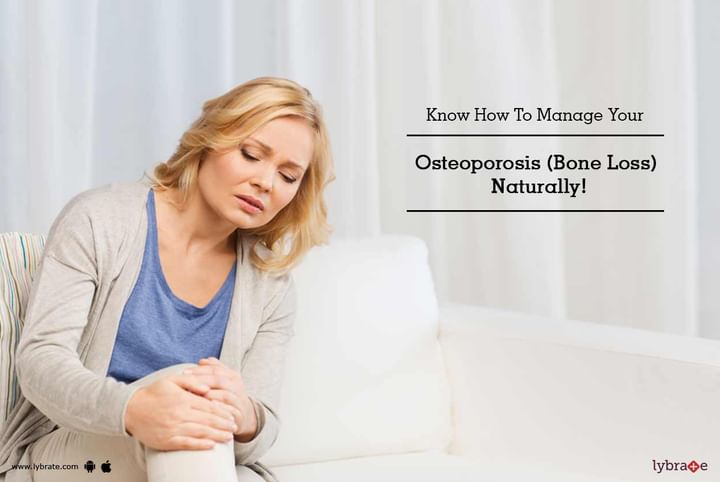Know How To Manage Your Osteoporosis (Bone Loss) Naturally!
Osteoporosis (meaning porous bones) refers to a medical condition in which the bones of an individual become thin and weak. The previous stage is called osteopenia (a precursor to osteoporosis). The bones become fragile and therefore start losing its strength. The medical researchers have reported that women are more prone to getting osteoporosis as compared to that of men, but that does not mean that men are completely immune to this disease. Where there are almost 50% women suffer from osteoporosis by the age of 60, there are about 30% of men who face the problem of osteoporosis.
Well, it has always been said that sooner you start taking care of your health especially bones, the better it is. Osteoporosis is a very common medical condition nowadays and major factors that are responsible for the increased prevalence of this disease is the lifestyle changes which include the living patterns and the diet changes.
What Causes Osteoporosis?
Osteoporosis happens when there is an imbalance between new bone formation and old bone resorption. The body may fail to produce enough new bone, or too much old bone may be reabsorbed, or both. If calcium intake is not sufficient or if the body does not absorb enough calcium from the diet, bone production and bone tissue may suffer. Thus, the bones may become porous, resulting in spongy and brittle, prone to fractures.
Other conditions that may lead to osteoporosis include overuse of corticosteroids (Cushing syndrome), thyroid problems, lack of muscle use, bone cancer, certain genetic disorders, use of certain medications, and dietary deficiency of calcium.
Risk factors for osteoporosis:
-
Women above 60 years of age.
-
Early menopause natural or surgical.
-
Poor diet & lifestyle i.e. Cigarette smoking, eating disorders such as anorexia nervosa or bulimia, low amounts of calcium in the diet, heavy alcohol consumption, inactive lifestyle.
-
Rheumatoid arthritis itself is a risk factor for osteoporosis
-
Family History of osteoporosis.
-
Overuse of corticosteroids
-
Hypothyroidism
-
Chronic Emotional stress
Foods That Cause Osteoporosis
-
Alcohol – Increases inflammation that can lead to more calcium being leached from bones.
-
Sweetened / Aerated drinks beverages – The sugary drinks like canned juices and aerated drinks like cola are the most dreadful drinks for your health especially bones, as these drinks extract the calcium from the bones. Carbonated drinks contain a lot of phosphates which is responsible for leaching of calcium from bones. It has been proven in a Harvard Study that the women just 16-20 years young had already started loss of bones as they were consuming a lot of carbonated drinks. Sugar is also responsible for inflammations.
-
Processed, red meat – A high intake of sodium and red meat may result in bone loss.
-
Caffeine/Tea – Excessive caffeine intake can result in bone loss as it causes hindrance in iron and calcium absorption from food.
Natural Treatments for Osteoporosis:
1. Osteoporosis Diet
To help you get all the vitamins and minerals you need to build and maintain strong bones, it’s important to eat a varied diet with adequate calories to fuel all your body’s processes. Mainly calcium and vitamin D are important. Other Nutrients needed to prevent bone disorders include iron, vitamin C and magnesium. Iron deficiency (anaemia) is a risk factor for osteopenia and osteoporosis because iron is essential for collagen synthesis and vitamin D metabolism. Vitamin C plays a role in collagen formation. It also helps stimulate the cells that build bones, enhances calcium absorption, and helps vitamin D to work properly.
Foods that provide Calcium include: dairy products like yogurt, milk or paneer. salmon or sardines; dark leafy green vegetables; and other veggies like broccoli, Makhanas (puffed lotus seeds), sesame seeds, calcium.
Magnesium rich foods include: leafy greens like spinach, pumpkin seeds, yogurt, black beans, figs, banana, cranberries, sunflower seeds, dark chocolates and Almonds & Avocados.
Sources of vitamin C include: citrus fruits, papaya or guava, berries, peppers, kiwi, broccoli and Amla(Indian gooseberry), star fruit, phalsa ,tomato.
Collagen protein: collagen is one component of bone that helps to build its framework and provide a flexible structure that can withstand pressure. Collagen is found naturally in things like bone broth or can be taken in protein powder form or supplement form.
Foods that supply Iron (which can help to prevent anaemia) include: chicken, fish, eggs, nuts, seeds, spinach, kala chana , garden cress seeds, dates and raisins etc.
Alkaline diet that helps protect bones. This means eating lots of veggies, fruit, sea vegetables and plant foods. Wheat grass is highly alkaline food.
It’s also best to lower the amount of sodium in your diet by eating more unprocessed/whole foods. It also helps to avoid things like: processed meats, fast foods, fried foods, canned goods, salty condiments or sauces, frozen meals, ready to eat meals etc. In addition, try to limit your intake of sugary products, sweetened drinks, alcohol and caffeine.
2. Practice Exercises:
To help maintain skeletal strength, it’s important to stay active. Osteoporosis has greater risk of fractures, so be careful while Exercising. Avoid strenuous and jerky movements. Exercise helps your body reduce the decline in bone mass associated with aging. It has many others benefits, too, such as contributing to hormone balance and a healthy body weight. Exercise is needed to keep muscles strong. It also helps with coordination and balance.
Weight-bearing exercises are the most beneficial for your bones, although this term often confuses people. Weight-bearing exercises include any type that “forces you to work against gravity” and that you practice with an upright posture. This way your bones and muscles must support your body weight.
To prevent and cure osteoporosis, yoga and Pranayama will be a great addition in your lifestyle. It will fix up your hormonal balance which is the root cause of problem. Oxygenation by breathing techniques will make your body alkaline and will help you in reducing bone sponginess. Cool, Calm and Clean environment and yoga practice – a wows combination for your health.
3. Take Supplements That Can Help Protect Bones
- Calcium: It’s best to obtain calcium from foods in your diet. However, you can take a supplement for boost. Most adults need about 1,000 milligrams daily. Choose calcium citrate, take it before meals for better absorption in a divided dose of 500mg everyday.
- Vitamin D: Experts recommend that people who have a history of deficiency, elderly adults,take a vitamin D supplement daily. Dosage recommendations vary person to person.
- Magnesium: Magnesium is a mineral; your body requires for proper calcium metabolism. Aim to get between 300–500 milligrams daily. Epsom salt bath is super source to get it through skin.
Ayurveda perspective of osteoporosis is, when vata (air) element is vitiated in our body and affects our bones is called Asthi Majja Kashaya. Traditionally used medicines for Asthi-majja kashaya (osteoporosis):Asthi shrinkhala ghrita, Shatavari, Ashwagandha churna, Shuddha guggulu, Mukta pisti, Praval pisti, Shankhabhama. Oil enemas (basti) particularly work on Asthi Dhatu (bones) and Majja Dhatu (bone marrow) along with Abhyangam therapy.
4. Maintain A Healthy Weight: Obesity can increase inflammation and contribute to hormonal changes that damage bones. Maintaining a healthy weight makes it easier to exercise and stay active into older age.
5. Get Enough Sunlight: Vitamin D helps improve calcium absorption. It’s best to obtain it via natural sunlight. To allow your body to make enough vitamin D to protect your bones, aim to get 15–20 minutes of sunshine on your bare skin daily.
6 Get Enough sleep: A sound sleep of at least 7-8 hours per day helps in better assimilation and absorption of nutrients. Lack of sleep may lead to adrenal fatigue and associated symptoms.
Final Thoughts on Osteoporosis:
Osteopenia is a condition characterized by lower-than-normal bone density. It precedes osteoporosis and causes brittle, weaker than normal bones that are more likely to fracture on minor jerk.
Risk factors for osteopenia include: being a woman following menopause; dieting or calorie restriction; eating disorders; taking medications that interfere with mineral absorption; anaemia; smoking cigarettes; too little exercise; obesity and a family history.
Natural treatments and prevention include: balanced diet with enough calcium and vitamin D; getting regular & safe exercise; maintaining a healthy weight; not smoking; and preventing vitamin D deficiency by getting adequate sunlight exposure and sound sleep, maintaining alkalinity in body. In case you have a concern or query you can always consult an expert & get answers to your questions!



+1.svg)
